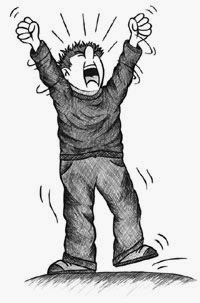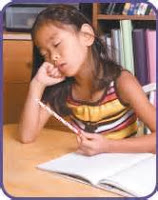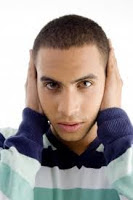Advice for Parents—
Teach your child to respond to your "signal" (e.g., your hand motion) to stay calm. Give that signal as soon as he or she starts "stewing" about something. If your child is too young for such self-control techniques, use distraction as soon as you notice him or her exhibiting a rage sign. A distraction, in order to be effective, has to be of interest to the youngster (e.g., suggest to your youngster, "Let's ride a bike" or, "Let's play a game").
It’s important to teach HFA kids to talk about how they feel. Give them a language to express their feelings. For example, ask them how they feel. If they are too angry to talk or don't have the vocabulary to express their feelings, ask about the feelings relevant to the specific situation. For example, "Do you feel embarrassed?" "Humiliated?" "Let down?" or, "Is your pride hurt?" When your child expresses the feeling behind his or her rage, such as embarrassment or humiliation, suggest some other ways to look at the same event that might not be embarrassing or humiliating.
The thought, "It's not fair," is a big rage-arouser for many kids on the autism spectrum. If that is the case, ask them, "Do you feel you are being treated unfairly?" When your child answers the question, listen and don't rush to negate his or her feelings.
If the child refuses to be distracted or engaged in dialoguing about his or her rage and starts yelling, stomping or breaking an object, impose appropriate consequences. It's better to have these consequences in place to serve as a guideline. That means that you have discussed them with your child beforehand and have written them out for future reference. Armed with a list of consequences (which preferably consist of withdrawing privileges or charging the child a "penalty"), moms and dads should encourage their child to choose such alternatives as doing something else, walking away, or talking about the rage rather than acting it out.
How about your own rage in response to your child's rage? You can set an example of “rage control” for your youngster. No teaching technique is as effective as a parent "modeling" for the youngster with his or her own example.
One thing that makes many moms and dads angry is to see their own child challenging their authority and defying them. Sometimes, it may appear so, but that may not be the intention of the child. For example, he or she may be too unhappy to be told “no” because he or she wants it so badly. Of course, you shouldn't give in to the wishes of the child, but try to understand what might really be the intention behind the behavior.
Some HFA kids get upset when they know they made a mistake. Instead of admitting their mistake, they act-out in rage to deflect the attention off them. If you realize that this may be the case, it's helpful to say to your child, "Everyone makes mistakes. I am okay with it. Don't feel so bad about it."
Advice for Teachers—
Kids on the spectrum, who in a rage lash out at others, should be often reminded of such consequences as going to the Principal's office, being detained and losing privileges at home. If the rage outbursts occur in relation to classmates and you didn't observe the whole interaction from the very beginning, it's better to impose a penalty on all parties involved.
Some HFA kids get angry because they don't have appropriate peer-interaction skills. For example, some don't know how to join in a conversation or a game. They abruptly try to get in. When resisted or rejected by peers, they explode. Teaching appropriate social skills can go a long way to avoid such negative encounters. We can establish a culture that reduces rage and teaches tolerance. For example, we can set a personal example for these "special needs" kids that "big people" do apologize and it's graceful to loose and try again.
Rage is believed to have three components (Lewis & Michalson, 1983):
1. The Emotional State of Rage. The first component is the emotion itself, defined as an affective or arousal state, or a feeling experienced when a goal is blocked or needs are frustrated. Fabes and Eisenberg (1992) describe several types of provocations that young Aspergers kids face daily in classroom interactions:
- Conflict over possessions, which involves someone taking the kid's property or invading their space.
- Issues of compliance, which often involve asking or insisting that HFA kids do something that they do not want to do--for instance, wash their hands.
- Physical assault, which involves one child doing something to another child, such as pushing or hitting.
- Rejection, which involves a youngster being ignored or not allowed to play with peers.
- Verbal conflict, for example, a tease or a taunt.
2. Expression of Rage. The second component of rage is its expression. Some HFA kids vent or express rage through crying, but do little to try to solve a problem or confront the provocateur. Others actively resist by physically or verbally defending their positions, self-esteem, or possessions in non-aggressive ways. Still others express rage with aggressive revenge by physically or verbally retaliating against the provocateur. Some HFA kids express dislike by telling the offender that he or she cannot play or is not liked. Others express rage through avoidance or attempts to escape from or evade the provocateur. And some use adult seeking, looking for comfort or solutions from a teacher, or telling the teacher about an incident.
Educators can use child guidance strategies to help HFA kids express angry feelings in socially constructive ways. These young people develop ideas about how to express emotions (Michalson & Lewis, 1985; Russel, 1989) primarily through social interaction in their families and later by watching television or movies, playing video games, and reading books (Honig & Wittmer, 1992). Some kids on the spectrum have learned a negative, aggressive approach to expressing anger (Cummings, 1987; Hennessy et al., 1994) and, when confronted with everyday conflicts, resort to using aggression in the classroom (Huesmann, 1988). A major challenge for educators is to encourage AS and HFA kids to acknowledge angry feelings and to help them learn to express them in positive and effective ways before they escalate into rage.
3. An Understanding of Rage. The third component of the rage experience is understanding--interpreting and evaluating--the emotion. Because the ability to regulate the expression of rage is linked to an understanding of the emotion (Zeman & Shipman, 1996), and because the HFA kid's ability to reflect on their rage is somewhat limited, they need guidance from educators and moms and dads in understanding and managing their feelings.
The development of basic cognitive processes undergirds HFA kid's gradual development of the understanding of rage (Lewis & Saarni, 1985):
1. Memory. Memory improves substantially during early childhood (Perlmutter, 1986), enabling young HFA kids to better remember aspects of rage-arousing interactions. Children who have developed unhelpful ideas of how to express anger (Miller & Sperry, 1987) may retrieve the early unhelpful strategy even after educators help them gain a more helpful perspective. This finding implies that educators may have to remind some "special needs" kids, sometimes more than once or twice, about the less aggressive ways of expressing anger.
2. Language. Talking about emotions helps young kids on the spectrum understand their feelings (Brown & Dunn, 1996). The understanding of emotion is predicted by overall language ability (Denham, Zoller, & Couchoud, 1994). Educators can expect individual differences in the ability to identify and label angry feelings, because HFA kid's families model a variety of approaches in talking about emotions.
3. Self-Referential and Self-Regulatory Behaviors. Self-referential behaviors include viewing the self as separate from others and as an active, independent, causal agent. Self-regulation refers to controlling impulses, tolerating frustration, and postponing immediate gratification. Initial self-regulation in young HFA kids provides a base for early childhood educators who can develop strategies to nurture the emerging ability to regulate the expression of rage.
Guiding the expressions of rage:
Educators can help kids on the autism spectrum deal with rage by guiding their understanding and management of this emotion. The ideas described below can help these young people understand and manage angry feelings in a direct and non-aggressive so they don’t escalate into rage outbursts:
1. Create a Safe Emotional Climate. A healthy environment permits these children to acknowledge all feelings, pleasant and unpleasant, and does not shame rage. Healthy classroom systems have clear, firm, and flexible boundaries.
2. Model Responsible Rage-management. HFA kids have an impaired ability to understand emotion when grown-ups have anger issues themselves (Denham, Zoller, & Couchoud, 1994). Grown-ups who are most effective in helping these young people model responsible rage-management by acknowledging, accepting, and taking responsibility for their own angry feelings and by expressing them in direct and non-aggressive ways.
3. Help HFA kids Develop Self-Regulatory Skills. Educators do a lot of self-regulation "work," realizing that the these students in their classroom have a very limited ability to regulate their own emotions. As these kids get older, grown-ups can gradually transfer control of the self to the children, so that they can develop self-regulatory skills.
4. Encourage them to Label Feelings of Rage. Educators and moms and dads can help young kids on the spectrum to produce a label for their rage by teaching them that they are having a feeling and that they can use a word to describe it. A permanent record (a book or chart) can be made of lists of labels for anger (e.g., mad, irritated, annoyed), and the class can refer to it when discussing angry feelings.
5. Encourage them to Talk About Rage-Arousing Interactions. HFA kids better understand rage and other emotions when grown-ups explain emotions (Denham, Zoller, &Couchoud, 1994). When these kids are embroiled in a rage-arousing interaction, educators can help by listening without judging, evaluating, or ordering them to feel differently.
6. Use Books and Stories about Rage to Help HFA Children to Understand and Manage Rage. Well-presented stories about rage and other emotions validate the kid's feelings and give information about rage (Jalongo, 1986; Marion, 1995). It is important to preview all books about anger, because some stories teach irresponsible “rage-management.”
7. Communicate with other moms and dads. Some of the same strategies employed to talk with moms and dads about other areas of the curriculum can be used to enlist their assistance in helping these kids learn to express emotions. For example, articles about learning to use words to label rage can be included in a newsletter to moms and dads.
Children on the spectrum guided toward responsible rage-management are more likely to understand and manage angry feelings directly and non-aggressively and to avoid the stress often accompanying poor anger-control (Eisenberg et al., 1991). Educators can take some of the bumps out of understanding and managing rage by adopting positive guidance strategies.
==> Parenting System that Reduces Defiant Behavior in Teens with Autism Spectrum Disorder
==> Launching Adult Children with Autism Spectrum Disorder: Guide for Parents Who Want to Promote Self-Reliance
==> Teaching Social-Skills and Emotion-Management to Children with Autism Spectrum Disorder
==> Parenting Children and Teens with High-Functioning Autism: Parents' Comprehensive Handbook
==> Unraveling the Mystery Behind High-Functioning Autism: Audio Book
==> Crucial Research-Based Parenting Strategies for Children and Teens with High-Functioning Autism
Resources for Neurodiverse Couples:
==> Online Group Therapy for Men with ASD
==> Online Group Therapy for NT Wives
==> Living with ASD: eBook and Audio Instruction for Neurodiverse Couples
==> One-on-One Counseling for Struggling Individuals & Couples Affected by ASD
==> Online Group Therapy for Couples Affected by Autism Spectrum Disorder
==> Cassandra Syndrome Recovery for NT Wives
==> ASD Men's MasterClass: Social-Skills Training and Emotional-Literacy Development
==> Pressed for time? Watch these "less-than-one-minute" videos for on the go.



















.jpg)


